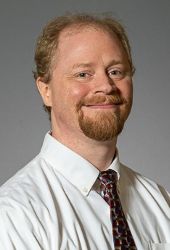
by Jacob Kirchner, student writer
For more than 20 years, Dr. Gabriel Foust, an associate professor of computer science, has made an impact through his teaching at Harding and his work outside the classroom. Since joining the faculty in 2004, he has taught a wide array of computer science courses with a particular interest in theoretical and mathematical computing concepts. He also teaches an honors course titled “The Physical World” that explores the intersection between scientific thinking, our world and the Christian Faith. Foust says he enjoys “taking a complicated subject and breaking it down into a logical progression to help students work their way through it.” He compares this process to breaking down a hard programming problem into “small digestible bits” to create organized steps a computer can understand. Software development major Julie Cmelik is also in Dr. Foust’s honors course and loves seeing his passion about content. “I am very blessed to have a teacher who gets excited about what he is teaching,” she said. “He has so much talent and could be doing many other things, but he chooses to stay at Harding to teach us.”
Foust’s impact expands beyond the classroom to include work for ArcBest Technologies, a subsidiary of the ArcBest Corporation. For two consecutive summers, he worked on teleoperated forklifts that can travel autonomously or be remotely controlled. The forklifts can be directed from point A to point B, but human operators take over for loading and unloading materials. Foust’s role focused on writing code using WebRTC, a peer-to-peer communication protocol, to allow direct communication between the forklift and the web browser. This connection is used to send video streams and analytical metrics to the human user controlling the forklift. Foust created the connection between the users and the robotics team in charge of the machines. Foust’s work is part of active and continuous research that began before his contribution, but he has made a profound impact in this sector of technological research.
Any discussion of technological innovation will raise broader questions about the role of autonomy, robotics and artificial intelligence in our society. While Foust emphasizes that autonomous robots are task-driven rather than problem-solving models like AI, both have similar implications when viewed from an ethical and Christian perspective. Rather than the world’s “progress for the sake of progress” approach, Foust encourages discernment of the end goal. By removing the need for forklift drivers in the warehouse, Foust’s work reduces the number of dangerous situations and potential injuries.
He continues to urge caution when implementing artificial intelligence, believing that there are some tasks for which computers should not be responsible. Foust asserts “[Christians] believe humans are more than just machines,” and “we need to be cautious in attributing sentience to a machine.” He uses the example of the Turing Test, which evaluates the ability of a machine to exhibit behavior indistinguishable from humans. “If [a machine] can fool me into thinking it's a human, it must be a human,” he said. “The current generation of AI has shown us that is not true. Machines can definitely fool you into thinking they are human without any kind of sentience.”
As technological advances reduce or shift the role of humans in favor of computers, we must keep Christian ethics at the forefront of our minds. Foust’s work reminds us of the incredible wonders that can be accomplished with technology, but our work must be guided by wisdom, humility and discernment as we approach the ineffable.